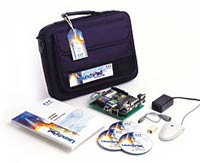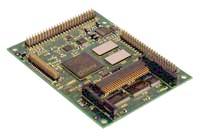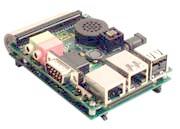Modular credit-card computer gains modular Linux dev kit
Sep 2, 2004 — by LinuxDevices Staff — from the LinuxDevices Archive — 1 views DSP Design has released a Linux development kit for its Alchemy-based credit-card-sized SBC (single board computer). The Linux LaunchPad for the Aurora1100 SBC bundles the board pre-installed with Linux, a host environment, tutorials, and sample applications. It targets developers of PDAs, display stations, and military devices.
DSP Design has released a Linux development kit for its Alchemy-based credit-card-sized SBC (single board computer). The Linux LaunchPad for the Aurora1100 SBC bundles the board pre-installed with Linux, a host environment, tutorials, and sample applications. It targets developers of PDAs, display stations, and military devices.
(Click for slightly larger view of Aurora1100 with add-on boards)
 DSP has shipped Linux development kits, or “LaunchPads” as it calls them, since May of 2001. The company previously supported only WinCE on the Aurora1100, however. Interestingly, a poll on the company's website suggests Linux is more popular than Windows, a conclusion also reached by a VDC study released yesterday.
DSP has shipped Linux development kits, or “LaunchPads” as it calls them, since May of 2001. The company previously supported only WinCE on the Aurora1100, however. Interestingly, a poll on the company's website suggests Linux is more popular than Windows, a conclusion also reached by a VDC study released yesterday.
Spokesperson Kath Deas claims the Linux LaunchPad's Ethernet-based remote-hosted development environment can be set up in one day or less. It includes host tools that enable developers to compile applications, download them to target hardware, and remotely debug them from the host computer.
The LaunchPad includes a modular Linux 2.4.21 kernel designed to minimize space taken up by drivers for unneeded peripherals. LaunchPad also includes general purpose embedded utilities and applications, such as busybox and others.
The Aurora 1100 SBC
 The Aurora1100 mainboard (pictured at right) measures 3.36 x 2.51 inches (85.4 x 63.8mm) and is powered by a 400MHz AMD Alchemy Au1100, a MIPS32-based SoC (system-on-chip) with an integrated LCD display controller. The board includes 64MB of SDRAM, and 32MB of soldered-down Flash memory, along with a CompactFlash socket. Additional peripherals include:
The Aurora1100 mainboard (pictured at right) measures 3.36 x 2.51 inches (85.4 x 63.8mm) and is powered by a 400MHz AMD Alchemy Au1100, a MIPS32-based SoC (system-on-chip) with an integrated LCD display controller. The board includes 64MB of SDRAM, and 32MB of soldered-down Flash memory, along with a CompactFlash socket. Additional peripherals include:
- Mono, CSTN, and TFT LCD interface
- Analog resistive touch screen controller
- 8×14 keypad controller
- 2 USB host ports
- 10/100 Ethernet
- SIR compatible IrDA
- 3 RS232 serial ports (one with RS485 option)
- AC97 audio codec
- 4-channel 12-bit ADC
- Power management and suspend-mode operation
- Watchdog timer and reset control
- 512byte serial EPROM for setup information
- on-board calendar clock
- 3.3V power supply
- 0 to 70C operating range
 DSP Design also offers a number of add-on devices for the board:
DSP Design also offers a number of add-on devices for the board:
- Connector breakout board (pictured at right)
- Memory card adapter board to add a second CF card and buffered connection to 16 GPIO lines (8 each, input and output)
- LCD adapter boards of various types
- VGA CRT adapter board
The Linux LaunchPad for the Aurora1100 PDA is available now, and the PDA board is available in single quantities, or in bulk.
This article was originally published on LinuxDevices.com and has been donated to the open source community by QuinStreet Inc. Please visit LinuxToday.com for up-to-date news and articles about Linux and open source.